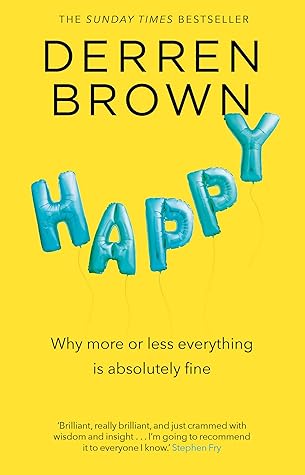More on this book
Community
Kindle Notes & Highlights
by
Derren Brown
Started reading
April 18, 2022
He believed that human beings are meant for greater things, and that a certain joy comes from fulfilling what is best and most noble in our nature.
People take longer-lasting pleasure from being kind to others than having others be kind to them; likewise, there is a deeper happiness to be had in knowing that your life is part of a story of flourishing than there is in merely pursuing entertainment.
The twin schools of Epicureanism and Stoicism sought to do that and, as I’ve already mentioned, became hugely popular schools of thought for a long time. The rigour with which they approached the question of the good life has not since been surpassed, and it is from their world of thought that we are going to find many of our answers.
indulgence in fine food and drink might be what we associate with a modern ‘epicurean’, but original Epicureans rejected them. This was because such extravagance or intemperance was seen as tending to eventually cause more pain (hangover, illness, frustrated desire for further luxuries) than the fleeting pleasure they might provide in the moment. Epicureans lived a simple, ascetic life, believing that by limiting themselves to a few natural desires (such as friendship, bread and water), they would be far happier than those who finally bring pain upon themselves through entertaining greater
...more
Stoicism – founded by Zeno of Citium and named after the Stoa, the covered walkway in the Athenian marketplace where this new philosophy was expounded – also saw happiness in terms of tranquillity and, like Epicureanism, its approach centred on ensuring the absence of pain. Stoics taught, along with the Epicureans, that we should limit our desires, and that perceived problems in life are due to errors in judgement about those problems. If we change our attitude, the pain of those external factors can disappear.
Both schools of thought are ascetic to one degree or another in that they require a turning away from what might be seen as the common pleasures of life. The Stoics were, however, far more engaged in society than the Epicureans. The latter removed themselves from civil life and lived communally in walled ‘gardens’, whereas Stoics by contrast were active, politically engaged and far more concerned with being effective members of society. Later, Christians drew upon the Stoic ideal of the good citizen in their own ideation of the dutiful Christian as an active and productive member of the
...more
Cicero, the great Roman orator and statesman, later translated Stoic teaching into Latin and ensured its popularity for centuries to come.
it was said a Stoic sage would be able to happily endure torture on the rack because he would think to himself, ‘It isn’t me they are harming, just my body.’ While this sounds extreme, and indeed was seen as such by many in their day, there’s no doubt that this kind of thinking has managed to keep some prisoners and victims of torture sane in modern times.
rather than falling for that old fallacy of entering into a relationship thinking you will ‘change’ the other person to more comfortably reflect your values, you might see the qualities that separate them from you as precisely the features to celebrate. These qualities can complement our own: our laid-back approach to life can be challenged by the more active, dynamic ambition we might see in a partner, or vice versa.
happiness should not be our goal per se, and to chase it directly is a mistake. Instead, we should see it as a by-product, something achieved indirectly through the process of individual liberation from the levelling demands of society.


